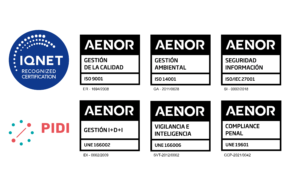The European DIGITbrain project has just started to give SMEs easy access to digital twins, which consists of a virtual representation of a product, service or process to optimize their management. PNO Innovation (coordinator), Technological Corporation of Andalusia (CTA), the Technological Institute of Aragon (ITAINNOVA), ENIDE Solutions and Inyecciones Montañana are the Spanish entities of 36 European partners. DIGITbrain (GA 952071) is funded by the Horizon 2020 programme of the European Union (EU). It has a duration of 3.5 years and a budget of more than 9 million euros.
DIGITbrain will empower the European network of digital innovation hubs to implement a smart business model called Manufacturing-as-a-Service (MaaS), which will facilitate the cost-effective, distributed and localized production of more specialised products. In addition, the project plans to open two calls aimed at ICT SMEs and manufacturers, with the aim of showing and validating the project results. In this sense, DIGITbrain will provide access to digital twins that bring agility and innovation to SMEs.
Digital Twins
A Digital Twin is the virtual representation of a product, system or process that simulates its physical attributes in the real-world in real time. By collecting data from its physical counterpart, manufacturers are enabled to streamline the manufacturing process and make predictions with regard to machine failures or maintenance needs.
The DIGITbrain concept will go one step further by developing the ‘Digital Product Brain’ which will store data throughout the entire life cycle of a production line or a machine. By collecting all this data, it will be possible to customise and set-up machines / production assets for very specific manufacturing tasks whenever needed. This will enable a new manufacturing model, called Manufacturing-as-a-Service (MaaS), which will allow for on-demand production of much more specialised products, even in smaller quantities and still in an economically profitable way.
Project justification
The global manufacturing industry is a challenging environment, since today’s customers have new requirements regarding the personalisation and the interoperability of new products and technologies. At the same time, legislations, regulations, and norms are becoming stricter; the environment calls for more protection and less pollution and the aging of the workforce jeopardises the collective know-how. Keeping pace with competitors often requires considerable investments in the latest digital technologies and advanced equipment, which is particularly challenging for small and medium-sized enterprises (SMEs) who often can’t afford such investments or can’t tell if they will turn out worthwhile.




